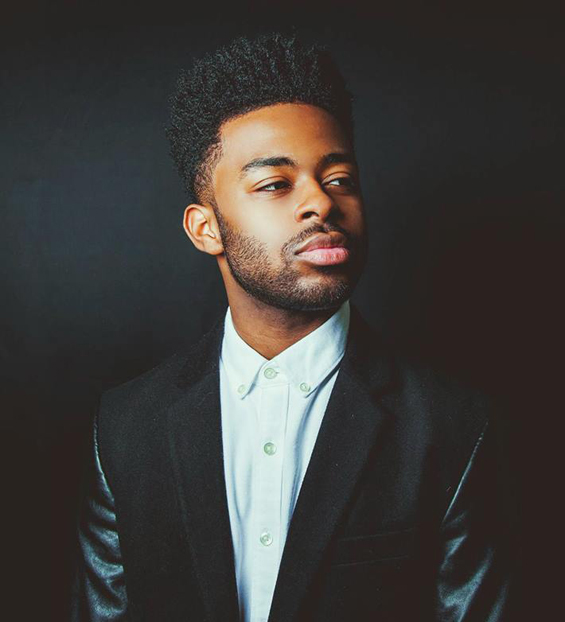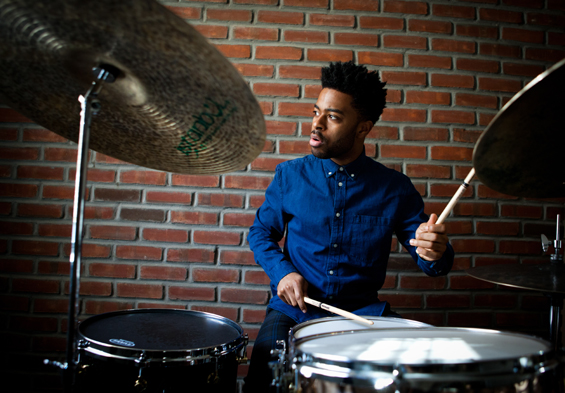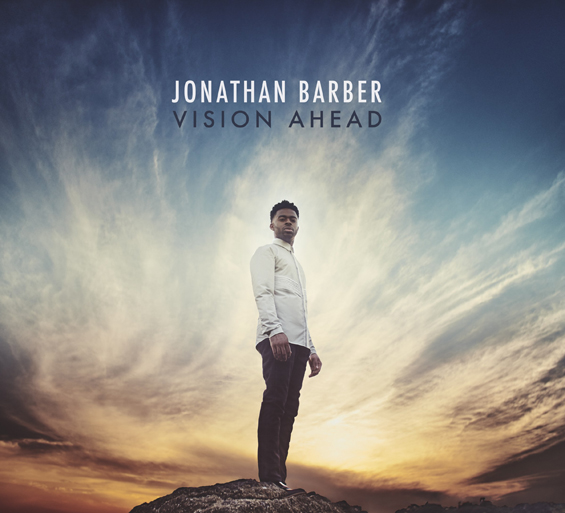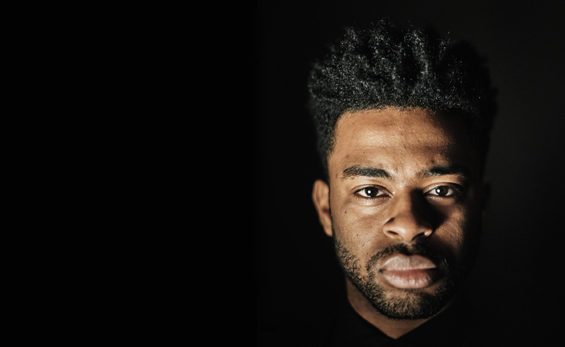

FIVE QUESTIONS WITH JONATHAN BARBER
All of us experience turning points in our lives, drummer Jonathan Barber no exception. A particularly devastating one occurred in November 2016 when the Hartford, Connecticut native learned of the death of his only brother, an event that prompted Jonathan to struggle with life's meaning and his own purpose. The feelings of confusion and despair that naturally accompanied that event gradually grew into an outlook focused on the future, positivity, and life's possibilities—in short, Vision Ahead, the title of both his debut album and the band featured on it. It's an inordinately assured and mature collection that features Barber not only fronting pianist Taber Gable, guitarist Andrew Renfroe, saxophonist Godwin Louis, bassist Matt Dwonszyk, and vocalists Denise Renee and Sasha Foster, but also writing most of the tunes and even singing. Its focus is primarily contemporary jazz, but other influences, among them R&B and hip-hop, find their way into the album also. The recording satisfies on many levels, and impresses in showing that great creative work can result from perseverance and the overcoming of adversity.
Though it's early in his career, Barber's already seen and done much. After graduating from the Jackie McLean Institute of Jazz at the University of Hartford's Hartt School of Music, the drummer established himself in the immediate area and in the New York jazz scene, and soon compiled a list of performance credits boasting names such as Jimmy Greene, Erykah Badu, Wallace Roney, Kenny Barron, John Patitucci, Harold Mabern, and Stefon Harris. A recent honour of note arrived in January 2018 when Jonathan was named best “Up & Coming” drummer in the 'Modern Drummer Readers Poll.' Currently promoting the just-released Vision Ahead, Jonathan found time recently to talk with textura about the new album, his key influences, and his experiences working with others and as a leader himself.1. You were named best “Up & Coming” drummer in the 2018 'Modern Drummer Readers Poll,' and your drumming on the album indicates that at this relatively early stage in your career you've reached an incredibly high level of technical proficiency. How has receiving such an accolade made a difference in your life on personal and professional grounds, and what challenges or goals are left to you as a drummer?
Well, first off, I'm honoured to received an award from Modern Drummer. As a kid growing up, I had a subscription to the magazine and always wanted to be featured in it. I guess this accolade truly exceeded beyond my expectations, and it's motivated me to continue to work hard and be true to my artistry. To see my work identified in the jazz industry and to receive global attention for my drumming is inspiring, and I hope it inspires other young drummers. I also hope it creates a higher platform for drummers playing jazz, especially when the attention jazz drummers receive isn't high compared to rock or pop drummers even though our influence on society and pop culture is just as viable as theirs. What's next on my list to is to tour my band as well perform solo at drum festivals and conferences.

2. One of the things I love about the album is its stylistic variety. Jazz is the core, but there's also your vocal tune (“Airport”) plus a few that sound as much rooted in soul balladry (“Think on These Things”) and hip-hop (“Carry On”) as jazz. Was it a conscious goal from the start of the project to include pieces that would encompass your different musical interests or is that something that simply arose as the recording process developed? Another thing that impresses about the music is that it doesn't shy away from embracing jazz tradition yet also feels thoroughly modern. Is that integration of traditional and contemporary forms something you deliberately set out to achieve?
The album Vision Ahead showcases the many styles that have influenced me. Being a working professional drummer, I get exposed to a lot of styles and musical sensibilities, but jazz, a music that has birthed so many genres, is definitely the core. While composing for the album, I wanted to create a story and a body of work that would represent me as a musician and a person; I also felt there was a calling for an album that's well-equipped in musicality and can give something to every type of listener.
I made a conscious decision to write songs with an undercurrent of improvisation and wanted to compose music that would unravel itself and show the unity of five musicians telling a story. “Statement of Vision,”“The Covenant,” “Time will Tell,” “Believing in the Reunion,” and “Carry On” are performed with no solos (“Airport” has one). The album's title song is a representation of the ‘Vision Ahead' concept: standing on the shoulders of the tradition while also foretelling what's to come. In composing the song, I took different isms from different jazz aasters. For example, during guitarist Andrew Renfroe's solo, I told bassist Matt Dwonszyk to play off the idea of Jackie Mclean's “Third World Express” and Micheal Jackson's “Shake Your Body,” and also told pianist Taber Gable to comp like Herbie Hancock's “Actual Proof” while I laid down an afrobeat groove. Andrew then quotes a line from Roy Hargrove's RH Factor “Poetry,” which sets up saxophonist Godwin Louis's solo over Benny Golson's “Stablemates.” I felt like that was a good presentation on taking the music forward.

3. Eight out of the twelve tracks on Vision Ahead were composed by you (and lyrics written by you on the ninth), and it's all high-quality, ambitious material. Is writing a difficult or easy process for you, and is it something that happens quickly or requires a lengthy period of time?
Composing the music was a process for me. It wasn't hard, but I was constantly constructing the songs and adding ideas on top of what I's already composed. I wanted the songs to have a flow from start to finish. I focused on each instrument and wanted to create room for all of the band members to contribute their musical voices to the music. The lyrics to the songs came to me easily; once I wrote down one lyric the rest followed, and many times I hear words with musical phrases. I wanted to add lyrics to my album so the listener would have something to remember and feel apart from the music by saying or singing the phrase.
4. Obviously your late brother was a key inspiration for the album, but were there specific musical figures who served as inspirations or influences for the album material? And if so in what ways did they inspire and/or influence you?
My father, John Barber Jr., is the person who introduced me to the drums so he'll always be an influence. Jackie Mclean, Rene Mclean, Eric Mcpherson, Miles Davis, John Coltrane, Tony Williams, Herbie Hancock, George Duke, Fred Hammond, Pat Metheny, Weather Report, and Yellowjackets are artists I grew up listening to or studied in college and who helped me develop as a musician. In creating the album, I wanted to create a sound that reflected the influenced of the people I grew up listening to. Although it physically took about eight months to complete Vision Ahead, my entire lifetime was involved in its creation.

5. You've played with an impressive number of well-known figures, among them Erykah Badu, Wallace Roney, Kenny Barron, John Patitucci, and Charnett Moffett. What has the experience of playing with artists of this calibre taught you about fronting your own outfit? And was there an experience or two that was especially pivotal to your development?
Performing with all of those incredible artists, there's a certain level of intensity you have to bring to the stage. It's an amazing feeling improvising with those musicians. The biggest revelation I got from by playing with them is how well they make others sound. It can be intimidating performing with elite players, but tagging along their musical vision while also presenting your own personal statement is something special.
I'm really into bands and the cohesive sound they produce (Miles Davis Quintet 1965-1968, Weather Report, The Roots, Earth Wind and Fire, Commissioned, Yellowjackets, Jazz Messengers). It's a goal of mine to be recognized as an artist who has a great band, and I must say I take pride in the chemistry and sound that my band produces. I want each of my band members to feel special and important about being in Vision Ahead.
May 2018![]()